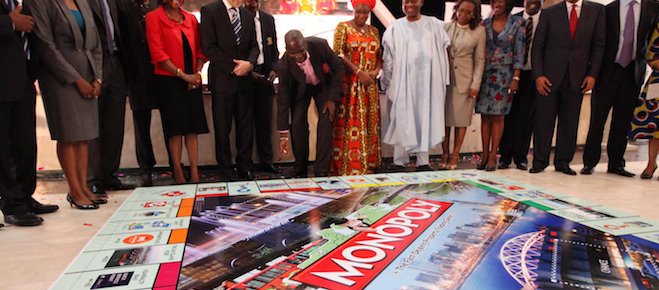Africa gets on the Monopoly board
Why build a house on Boardwalk when you can build a hotel on Banana Island?
Babatunde Raji Fashola, Lagos state governor, center, rolls a dice during the presentation of a Lagos-themed Monopoly board game in Lagos, Nigeria, Tuesday, Dec. 11, 2012. Nigeriaâs largest city of Lagos is no boardwalk, but now Monopoly is taking an inspiration from the sprawling chaos. (AP Photo / Sunday Alamba )
Share

Forget Boardwalk: players scheming and dealing real estate in the latest version of Monopoly will have their sights set on Banana Island. The man-made island is home to the wealthiest citizens in Lagos, Nigeria, the first African city depicted by the popular board game. In the new Lagos edition, the cheapest property—Mediterranean Avenue in the original game—can be found in Makoko, the vast slum built over a lagoon on the edge of the city. “The cards have been tailored to the Nigerian peculiarities,” says Adeoye Omotayo, spokesperson for the PR company handling the launch. Players might pick a card that sends them to a psychiatric facility for driving the wrong way down a one-way road, he explains, adding that that particular traffic oddity is common in Lagos.
So why base the first African city Monopoly board on Lagos? By some estimates, it is now Africa’s largest city. “Lagos is a megacity. It is a strong commercial hub for Africa,” Omotayo says. And it is the heart of Nigeria’s oil-driven economy. The wealth—and corruption—generated from oil exports are visible on the new board game, too. A wrong roll of the dice could hand you a card that reads: “For attempting to bribe a law enforcement agent, pay a fine.”